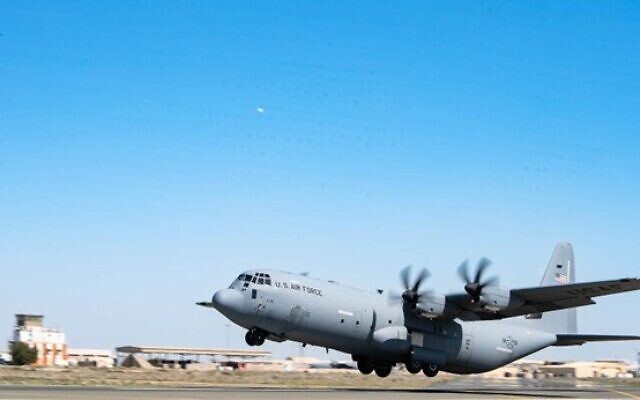



WASHINGTON, DC — US military C-130 cargo planes on Saturday dropped food in pallets over Gaza, three US officials said, two days after more than 100 Palestinians who had surged to pull goods off an aid convoy were killed during a chaotic encounter with Israeli troops.
Three planes from Air Forces Central dropped 66 bundles containing about 38,000 meals into Gaza at 3:30 p.m. local time, according to two of the officials, who spoke on condition of anonymity before a public announcement.
The airdrop is expected to be the first of many announced by US President Joe Biden on Friday. The aid will be coordinated with Jordan, which has also conducted airdrops to deliver food to Gaza.
At least 115 Palestinians were killed and hundreds more wounded on Thursday as they swarmed aid trucks that entered the city. Hamas accused Israel of shooting at the crowds. Israel said many of the dead were trampled in a chaotic crush for the food aid, and that its troops only fired at a few individuals who rushed toward them in a threatening manner. Jerusalem has been under growing international pressure to launch an in-depth investigation.
White House national security spokesperson John Kirby said Friday that the airdrops were planned to deliver emergency humanitarian assistance in a safe way to people on the ground.
The C-130 cargo plane is a widely used military jet to deliver aid to remote places due to its ability to land in austere environments and cargo capacity.
A C-130 can airlift as much as 42,000 pounds of cargo and its crews know how to rig the cargo, which sometimes can include even vehicles, onto massive pallets that can be safely dropped out of the back of the aircraft.
Air Force loadmasters secure the bundles onto pallets with netting that is rigged for release in the back of a C-130, and then crews release it with a parachute when the aircraft reaches the intended delivery zone.
The Air Force’s C-130 has been used in years past to airdrop humanitarian aid into Afghanistan, Iraq, Haiti and other locations, and the airframe is used in an annual multi-national “Operation Christmas Drop” that airdrops pallets of toys, supplies, nonperishable food and fishing supplies to remote locations in the Federated States of Micronesia and the Republic of Palau.
The delivery of aid to Gaza has been a point of contention in the devastating five-month war, triggered by the unprecedented shock Hamas attack on October 7, when thousands of terrorists rampaged through southern Israeli communities, killing some 1,200 people and taking 253 hostages.
Israel, which checks all trucks entering Gaza from both crossings, has blamed the United Nations for not delivering the aid fast enough after they are cleared, and for leading to a general fall-off in deliveries over the past month.
The UN has said it is becoming more difficult to distribute aid inside Gaza. The flow of aid from Egypt has almost dried up in the past two weeks, and a collapse in security has made it increasingly difficult to distribute the food that does get through, according to UN data and officials.
While more trucks have arrived through Israel’s Kerem Shalom crossing, they have, of late, been disrupted by relatives of Israeli hostages and protesters seeking to block deliveries. Israel has repeatedly said it is prepared to speed up the clearance of aid.
The UN says a quarter of Gaza’s 2.3 million people face starvation. Aid officials have said that airdrops are not an efficient means of distributing aid and are a measure of last resort.
Before the war with Hamas, Gaza relied on 500 trucks with supplies entering daily.
The US has consistently pressured Israel to increase the delivery of aid since the war started, following the Hamas October 7 massacre.
Announcing the airdrops Friday, US President Joe Biden said: “We need to do more, and the United States will do more.”
“Aid flowing to Gaza is nowhere nearly enough,” Biden said, adding he would “insist” that Israel let in more aid trucks. “No excuses, because the truth is aid flowing to Gaza is nowhere near enough. Innocent lives are on the line and children’s lives are on the line.
“We won’t stand by until we get more aid in there. We should be getting hundreds of trucks in, not just several.”

